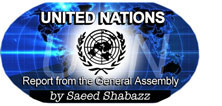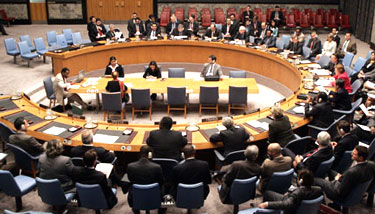By Saeed Shabazz -Staff Writer-

UNITED NATIONS (FinalCall.com) – Since at least 1993, African heads of state have been calling for Security Council reform during the world body’s annual General Assembly Debate.
But this year’s debate saw a larger number of African leaders addressing the issue during speeches and speaking in more profound terms.
Zimbabwe President Robert G. Mugabe told those gathered in New York for the 67th General Assembly Sept. 25 to Oct. 1 that Zimbabwe stands behind Africa’s demand for two permanent seats with the veto, plus two additional non-permanent seats on a reformed UN Security Council.
“For how long will the international community continue to ignore the aspirations of a whole continent of 54 countries?” asked President Mugabe, referring to the decades-long debate on reforming the 15-member body, and what role Africa would play.
Jacob Zuma, president of South Africa, added that the continent’s call was for “meaningful representation in the Security Council.” President Ellen Johnson-Sirleaf of Liberia told the annual gathering her delegation was “encouraged that an increasing number of countries supported the enlargement of the Security Council,” and such enlargement would “ensure a fairer and more equitable participation of the world demography.”

Ali Ahmed Karti, Sudan’s minister of foreign affairs, echoed a familiar theme in telling the 193-member body the Security Council must take on the importance it deserves and no longer represented “the modern situation.”
Observers say the call for council reform by African leaders is more profound this year because the region is witnessing stronger political and economic developments, seeing dissatisfaction of emerging powers with the status quo, and a growing influence among developing nations via organizations such as the 120-state Non-Aligned Movement.
Iranian President Mahmoud Ahmadinejad, who also heads the Non Aligned Movement for this year, called the Security Council dictatorial and dominated by a few powers, but he added there was “a new willingness” to treat Security Council reform as a top priority.
A range of African government officials and leaders connected the dots to how a greater representation for the continent on the Security Council would help combat the twin scourges of war and poverty. Angola’s Permanent Ambassador Gaspar Martins said, “The Security Council plays a preeminent role in the prevention and the resolution of conflicts and the maintenance of peace; therefore the session’s theme of peaceful settlement of disputes relates to the need for reform of the council.”
Osman Mohammed Saleh, minister for foreign affairs for Eritrea said Africa remains marginalized and almost voiceless at the UN because the Security Council is dominated by powerful members benefitting from an “anachronistic order” and the UN Charter was “willfully flouted.”
The UN Security Council, according to GlobalSolutions.org, is relatively unchanged since the victors from World War II crafted a UN Charter that awarded five permanent veto-wielding seats to the United States, United Kingdom, France, China and Russia. “Since 1945 the essential rules governing the workings of the Council are literally frozen in a paralysis that is being more and more repulsive,” said Togo’s Minister of Foreign Affairs Elliot Ohin.
In 1965, the council was enlarged from 11 to 15 elected members. To reform the council requires an amendment to the UN Charter and the adoption and ratification by two-thirds of the UN General Assembly or 128 votes.
The Security Council largely remains the world’s final arbiter on matters of war and peace, given the ability to declare war under its Chapter VII provisions. It is also the only institution whose resolutions carry the weight of binding international law.
“That is why all regions should have full representation in the decisions of this important security organ,” said King Mswati III of Swaziland. “We should all be given equal treatment,” he stressed. “No region or country should impose its influence over others.”
“Our collective security will continue to be undermined by geo-political considerations unless and until we find the courage to reform the Security Council,” Gambia’s President Yahya Jammeh told the annual gathering of world leaders. Enforcing the Gambian president’s point was Malawi’s President Joyce Banda who noted “a significant proportion of the issues discussed in the Security Council concerns the African continent.”
Egypt’s President Mohamed Morsi’s much anticipated speech tied the world’s responsibility to support Africa’s efforts to development and economic growth to revitalizing the General Assembly and reforming the Security Council. “The reform of the Security Council must also remain high on the priority list of issues that must be tackled with the necessary seriousness,” President Morsi said.
James Paul, executive director of the New York-based Global Policy Forum, said one problem facing African leaders is “they don’t have a solid position in regards to UNSC reform.” The African Union says there should be two states on the council, but won’t say which two, he noted. “The fact that they are a bit up in the air doesn’t help their position,” said Mr. Paul.
The permanent members have “no intention of extending membership to anyone else,” he added.
But, Mr. Paul continued, the point wasn’t to say it should simply be accepted. “I’m just saying there needs to be another solution other than just wanting to be part of the club,” he explained.












